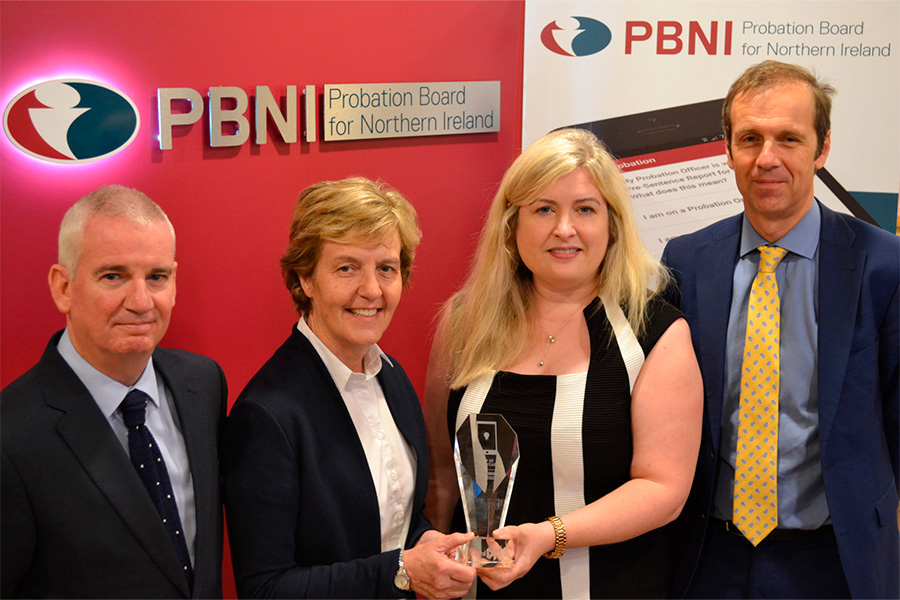Technology Implementation Case
Northern Ireland
The justice system presents a unique challenge compared to other public services, as people only interact with it when they are victims, witnesses, or perpetrators of a crime. When someone is sentenced to probation, the information provided can be complex and difficult to understand. It can be challenging for victims of crime and those who have offended, as well as their families, to navigate and comprehend the requirements of probation and what it means when someone is sentenced, to a Community Order or Licence1.
Recognising that probation delivery could be improved through the better use of digital solutions, the Probation Board for Northern Ireland (PBNI) set about developing a mobile app that was free, accessible, and would enable people to understand probation and easily access further support.
1 In Northern Ireland, a “Community Order” is a sentence that requires an offender to carry out unpaid work in the community and/or attend appointments with a probation officer. A “Community Licence” is a licence granted to offenders who have been released from prison early on licence. It allows them to be supervised in the community by a probation officer.
In January 2016, a working group was established to develop a probation app designed to assist people who have offended in changing their lives and seeking support and assistance. The “Changing Lives” app was developed and jointly launched by the Justice and Health Ministers highlighting the fact that people within the justice system often have complex issues and needs such as addiction and mental health issues.
The development team comprised communications staff, psychology staff and staff from Learning & Development. Service user feedback was also a key part of the development and piloting processes.
Upon launch in October 2016, the app was opened to staff and service users in general. PBNI promoted training sessions, team meetings, and communication campaigns to raise awareness of the app among staff, service users, stakeholders, and the public.
The resulting “Changing Lives” app is the first of its kind in Northern Ireland, developed specifically to help people who have offended desist from crime and reintegrate into society. Available on both Android and iOS, it enables people to identify their mental health problems and addictions and find support. It offers advice on how to overcome their particular issues and signposts people to appropriate services.
The app features an alcohol diary and tracker, and a journal, so that those on probation can register and share their progress or any challenges they face with their probation officer.
There is also a community service tracker where individuals under this measure can register the number of hours of work they have completed.
A contacts section in the app enables people to call directly through to probation staff as well as out-of-hours healthcare services, among others. People who believe they are at risk can directly call support lines, such as the Samaritans or Lifeline, from the app. The app also provides short online exercises to help people manage their thoughts and feelings.
Beyond the sections of the app specifically for people under Probation supervision, it also supports victims of crime registered with PBNI’s Victim Information Scheme.

The “Changing Lives” app has now been in place for seven years and during that time it has been refined and further developed to ensure it meets the needs of service users. Since then, it won two NI App of the Year awards, the UK App of the Year Award, and a runner up in the Irish App of the Year awards. It has been a useful tool for probation officers to engage further with service users and signpost them to relevant and easy to understand information. The app has been under constant review with information and feedback collected on an ongoing basis.
Both quantitative and qualitative data to assess and evaluate the app was collected through two evaluations in 2017 and 2020. As part of the 2020 evaluation six focus groups were held with service users of diverse backgrounds and age range, engaged in probation programmes.
The focus groups revealed some interesting feedback, notably that male service users had a different attitude to the app than the female clients.
Men exhibited a reluctance and suspicion towards using the app, while women seemed to embrace the app and its benefits. The latter were very open about using the mental health, addiction, and contact sections, and eager to provide feedback to improve the app. Service users overall found the sections on mental health and addictions particularly useful.
In response to the COVID-19 outbreak, PBNI swiftly and significantly adapted its operational approach to ensure the continued delivery of essential services to keep people safe. Technology was critical in enabling staff to provide uninterrupted services. Beyond increasing the use of video and teleconferencing during this period, the “Changing Lives” app was extensively employed, and clients were encouraged to download it.
This approach was well received, with positive feedback from service users, highlighting the usefulness of the journaling and mental health resources. Given the rapid pace of technological advancements, PBNI recognises the need to proactively explore opportunities to enhance the app to respond to the user’s needs.



Gail McGreevy has been the Head of Communications in
the Probation Board for Northern Ireland since 2009. Her
responsibilities include Internal/External Communications,
Records Management, Complaints and Data Protection/
Freedom of Information.


